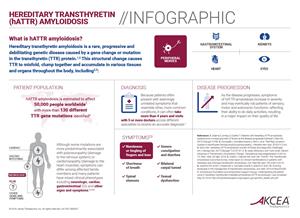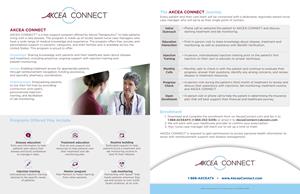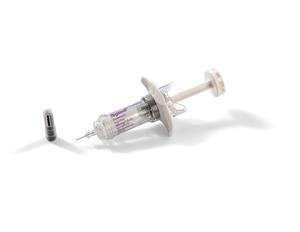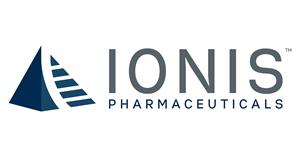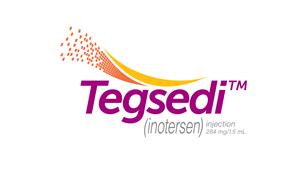Release Details
Akcea and Ionis Receive FDA Approval of TEGSEDI™ (inotersen) for the Treatment of the Polyneuropathy of Hereditary Transthyretin-Mediated Amyloidosis in Adults
TEGSEDI provides powerful knockdown of TTR protein, delivering significant and sustained benefits in neuropathy and quality of life
|
||||||||||||||||||||||||||||||
TEGSEDI is an effective treatment choice that allows self-administration at a time and place that works for the patient
Conference call and webcast scheduled for today at 5:45pm ET
BOSTON and CARLSBAD, Calif.,
“TEGSEDI is the first and only RNA-targeting therapeutic that powerfully reduces the production of TTR protein through a once-weekly subcutaneous injection offering patients an effective treatment for people living with polyneuropathy caused by hATTR amyloidosis. We believe this profile will make TEGSEDI an excellent choice for many patients and that it’s self-administration gives the flexibility to treat at a time that works for them which could change the way this progressive and debilitating disease is treated and managed,” said Paula Soteropoulos, chief executive officer at Akcea Therapeutics. “As we execute on our multi-country launch, we are committed to delivering a comprehensive treatment experience for people taking TEGSEDI. Beyond the drug itself, this includes ensuring patients who need this therapy have access to it, offering personalized support programs and enabling patients to administer treatment on their own terms.”
In hATTR amyloidosis, transthyretin (TTR) protein misfolds and accumulates as amyloid deposits throughout the body. TEGSEDI targets the disease at its source by reducing the production of TTR protein. In the NEURO-TTR study, treatment with TEGSEDI produced up to a 79% mean decrease from baseline in serum TTR protein in patients regardless of TTR mutation, sex, age, or race.
"Although the true incidence is not known of hereditary ATTR amyloidosis with polyneuropathy, there is no doubt that it is currently significantly underdiagnosed,” said Isabelle Lousada, founder and chief executive officer of the
The FDA’s approval of TEGSEDI was based on results from the Phase 3 NEURO-TTR study in patients with hATTR amyloidosis with symptoms of polyneuropathy. Results from that study demonstrated that patients treated with TEGSEDI experienced significant benefit compared to patients treated with placebo across both co-primary endpoints: the Norfolk Quality of Life Questionnaire-Diabetic Neuropathy (Norfolk QoL-DN) and modified Neuropathy Impairment Score +7 (mNIS+7), a measure of neuropathic disease progression.
TEGSEDI is associated with risk of thrombocytopenia and glomerulonephritis. Enhanced monitoring is required to support early detection and management of these identified risks. For TEGSEDI’s full prescribing information, including boxed warning, please visit www.TEGSEDI.com and please see Important Safety Information below. TEGSEDI is being marketed with a Risk Evaluation and Mitigation Strategy (REMS).
"hATTR amyloidosis is a fatal disease that affects multiple organs and body systems and robs people of so much – the ability to work, the ability to carry out daily tasks – all the things that make them feel in control of their lives,” said Morie Gertz, M.D., hematologist and Chair Emeritus of Internal Medicine at
To assist hATTR amyloidosis patients in gaining access to TEGSEDI, Akcea has created Akcea ConnectTM, a patient support program made up of dedicated, regionally-based nurse case managers who have a wide range of medical knowledge and experience.This program offers free, private and personalized support to patients and their caregivers and families across the United States. Akcea Connect is now accepting patient enrollment and authorization forms.For more information, please see the contact information for Akcea Connect below.
“hATTR amyloidosis is a devastating disease that takes so much from patients. Akcea is ready to help patients take something back,” said Sarah Boyce, president of Akcea Therapeutics. “We understand that managing a rare disease goes beyond providing a new medicine and our highly skilled team is fully prepared to provide an effective, safe and comprehensive treatment experience. Our industry-leading patient support program, Akcea Connect, is poised to help patients through every stage of their TEGSEDI treatment journey, and we are well advanced in discussions with leading payers to facilitate access. We are excited and ready to execute on our launch plans and bring TEGSEDI to patients.”
“The U.S. approval of TEGSEDI represents another important addition to the expanding Ionis commercial pipeline, a product of 30 years of innovation. We are thrilled to see our efforts result in an important new medicine for people with polyneuropathy caused by hATTR amyloidosis,” said Brett P. Monia, Ph.D., chief operating officer of
In April, Akcea licensed the worldwide rights to commercialize TEGSEDI from Ionis. Based on the U.S. approval of TEGSEDI, Ionis will receive a
CONFERENCE CALL
Akcea and Ionis will hold a live webcast today,
ABOUT TEGSEDITM (INOTERSEN)
TEGSEDI was approved by the
The approval is based on data from the NEURO-TTR study that was a Phase 3 randomized (2:1), double-blind, placebo-controlled, 15-month, international study in 172 patients with hATTR amyloidosis with symptoms of polyneuropathy. In NEURO-TTR, TEGSEDI demonstrated significant benefit compared to placebo in measures of neuropathy and quality of life as measured by the modified Neuropathy Impairment Score +7 (mNIS+7) and in the Norfolk Quality of Life Questionnaire-Diabetic Neuropathy (Norfolk QOL-DN) total score. Patients treated with TEGSEDI experienced similar benefit regardless of subgroups such as age, sex, race, region, Neuropathy Impairment Score (NIS), Val30Met mutation status, and disease stage.
The approval is also based on data from the NEURO-TTR Open Label Extension (OLE) that is an ongoing study for patients who completed the NEURO-TTR study, designed to evaluate the long-term efficacy and safety of TEGSEDI.
For TEGSEDI’s full prescribing information, please visit www.TEGSEDI.com.
IMPORTANT SAFETY INFORMATION
TEGSEDI can cause serious side effects including:
Low platelet counts (thrombocytopenia): TEGSEDI may cause the number of platelets in your blood to be reduced. This is a common side effect of TEGSEDI. When your platelet count is too low, your body cannot form clots. You could have serious bleeding that could lead to death. Call your healthcare provider immediately if you have:
- Unusual bruising or a rash of tiny reddish-purple spots, often on the lower legs
- Bleeding from skin cuts that does not stop or oozes
- Bleeding from your gums or nose
- Blood in your urine or stools
- Bleeding into the whites of your eyes
- Sudden severe headaches or neck stiffness
- Vomiting or coughing up blood
- Abnormal or heavy periods (menstrual bleeding)
Kidney inflammation (glomerulonephritis): Your kidneys may stop working properly. Glomerulonephritis can lead to severe kidney damage and kidney failure that need dialysis. Call your healthcare provider immediately if you have:
- Puffiness or swelling in your face, feet, or hands
- New onset or worsening shortness of breath and coughing
- Blood in your urine or brown urine
- Foamy urine (proteinuria)
- Passed less urine than usual
Because of the risk of serious bleeding caused by low platelet counts and because of the risk of kidney problems, TEGSEDI is available only through a restricted program called the TEGSEDI Risk Evaluation and Mitigation Strategy (REMS) Program. Talk to your healthcare provider about how to enroll in the TEGSEDI REMS Program.
Do not use TEGSEDI if you have:
- A platelet count that is low
- Had kidney inflammation (glomerulonephritis) caused by TEGSEDI
- Had an allergic reaction to inotersen or any of the ingredients in TEGSEDI. See the end of the Medication Guide for a complete list of ingredients in TEGSEDI
Before you start TEGSEDI, tell your healthcare provider about all of your health issues, including if you:
- Have or had bleeding problems
- Have or had kidney problems
- Are pregnant or plan to become pregnant. It is not known if TEGSEDI can harm your unborn baby
- Are breastfeeding or plan to breastfeed. It is not known if TEGSEDI can pass into your breast milk or harm your baby. Talk with your healthcare provider about the best way to feed your baby while you are taking TEGSEDI
Tell your healthcare provider about all the medicines you take, including prescription and over-the-counter medicines, vitamins, and herbal supplements. Especially tell your healthcare provider if you take vitamin A or beta-carotene supplements, blood thinners (anticoagulants), or drugs that affect blood clotting.
Required monitoring
Your healthcare provider will test your blood and urine to check your platelet counts and kidney and liver function before you start TEGSEDI. While you are receiving TEGSEDI, you will be monitored closely for symptoms, which includes checking your platelet counts every week (or more frequently as needed), kidney function every 2 weeks, and liver function every 4 months. If your healthcare provider has you stop taking TEGSEDI, you will need to continue to get your blood and urine tested for 8 more weeks after treatment.
TEGSEDI may cause serious side effects, including:
Stroke. TEGSEDI may cause a stroke. One person taking TEGSEDI had a stroke, which occurred within 2 days after the first dose. Get emergency help immediately if you have symptoms of stroke, including sudden numbness or weakness, especially on one side of the body; severe headache or neck pain; confusion; problems with vision, speech, or balance; droopy eyelids.
Inflammatory and immune system problems. Some people taking TEGSEDI had serious inflammatory and immune system problems. Symptoms of inflammatory and immune system problems included unexpected change in walking, weakness and spasms in legs, back pain, weight loss, headache, vomiting, and problems with speech.
Liver effects. TEGSEDI may cause liver problems. Your healthcare provider should do laboratory tests to check your liver before you start TEGSEDI and while you are using it. Tell your healthcare provider if you have symptoms that your liver may not be working right, which could include unexpected nausea and vomiting, stomach pain, being not hungry, yellowing of the skin, or having dark urine.
Allergic reactions. TEGSEDI may cause serious allergic reactions. These allergic reactions often occur within 2 hours after injecting TEGSEDI. Get emergency help immediately if you have any symptoms of a serious allergic reaction, including joint pain, chills, redness on palms of hands, muscle pain, chest pain, flushing, tremor or jerking movements, flu-like symptoms, high blood pressure, or difficulty swallowing.
Eye problems (low vitamin A levels). Treatment with TEGSEDI will lower the vitamin A levels in your blood. Your healthcare provider will tell you how much supplemental vitamin A to take every day; only take the amount they tell you to take. Call your healthcare provider if you get eye problems, such as having difficulty seeing at night or in low-lit areas (night blindness).
The most common side effects of TEGSEDI include injection site reactions (such as redness or pain at the injection site), nausea, headache, tiredness, low platelet counts (thrombocytopenia), and fever. These are not all of the possible side effects of TEGSEDI. Talk to your healthcare provider about any side affects you may be experiencing.
You are encouraged to report negative side effects of prescription drugs to the FDA. Visit www.fda.gov/medwatch or call 1-800-FDA-1088.
Please see Medication Guide and full Prescribing Information, including boxed WARNING.
ABOUT HEREDITARY TRANSTHYRETIN (hATTR) AMYLOIDOSIS
hATTR amyloidosis is a severe, progressive, and life-threatening disease caused by the abnormal formation of the TTR protein and aggregation of TTR amyloid deposits in various tissues and organs throughout the body, including in peripheral nerves, heart and intestinal tract. The progressive accumulation of TTR amyloid deposits in these organs often leads to intractable peripheral sensorimotor neuropathy, autonomic neuropathy, and/or cardiomyopathy, as well as other disease manifestations. hATTR amyloidosis causes significant morbidity and progressive decline in quality of life, severely impacting activities of daily living. The disease often progress rapidly and can lead to premature death. The median survival is 4.7 years following diagnosis1. Additional information on hATTR amyloidosis, including a full list of organizations supporting the hATTR amyloidosis community worldwide, is available at www.hattrchangethecourse.com or by visiting www.hATTRGuide.com.
ABOUT AKCEA CONNECT™
Akcea Therapeutics is committed to ensuring that patients have access to TEGSEDI. Our patient assistance program called AKCEA CONNECT offers assistance to qualified patients at no cost. AKCEA CONNECT offers personalized and dedicated support to patients and their care teams through best-in-class services. The program focuses on sharing KNOWLEDGE, enabling ACCESS and EMPOWERING patients in order to optimize care in rare diseases, improve patient outcomes, and enhance patients’ overall experiences. For more information please visit www.AkceaConnect.com or call 1-866-AKCEATX (1-866-252-3289).
ABOUT AKCEA THERAPEUTICS
ABOUT IONIS PHARMACEUTICALS
As the leader in RNA-targeted drug discovery and development, Ionis has created an efficient, broadly applicable, proprietary antisense technology platform with the potential to treat diseases where no other therapeutic approaches have proven effective. Our drug discovery platform has served as a springboard for actionable promise and realized hope for patients with unmet needs – such as children and adults with spinal muscular atrophy (SMA). We created SPINRAZA® (nusinersen)* and are proud to have brought new hope to the SMA community by developing the first and only approved treatment for this disease.
Our sights are set on all the patients we have yet to reach with a pipeline of more than 40 drugs with the potential to treat patients with cardiovascular disease, rare diseases, neurological diseases, infectious diseases and cancer. We created TEGSEDI™ (inotersen) the world’s first RNA-targeted therapeutic approved for the treatment of stage 1 or stage 2 polyneuropathy in adult patients with hereditary transthyretin (TTR) amyloidosis (ATTR) that our affiliate Akcea Therapeutics is commercializing. Together with Akcea, we are also bringing new medicines to patients with cardiometabolic lipid disorders.
To learn more about Ionis follow us on twitter @ionispharma or visit http://ir.ionispharma.com/.
*Spinraza is marketed by Biogen.
AKCEA’S AND IONIS’ FORWARD-LOOKING STATEMENT
This press release includes forward-looking statements regarding the business of
In this press release, unless the context requires otherwise, “Ionis”, “Akcea,” “Company,” “Companies” “we,” “our,” and “us” refers to
Ionis Pharmaceuticals™ is a trademark of
Akcea Media and Investor Contact:
Kathleen Gallagher
Vice President of Communications and Investor Relations
617-207-8509
kgallagher@akceatx.com
Ionis Investor Contact:
D. Wade Walke, Ph.D.
Vice President, Investor Relations
760-603-2741
wwalke@ionisph.com
Ionis Media Contact:
Roslyn Patterson
Vice President,
760-603-2681
rpatterson@ionisph.com
1. Swiecicki PL, et al. Amyloid. 2015;22(2):123-31;
Infographics accompanying this announcement are available at
http://www.globenewswire.com/NewsRoom/AttachmentNg/5454d263-63ee-413e-b9c8-47c9ebddbe04
http://www.globenewswire.com/NewsRoom/AttachmentNg/3a65b2a3-add0-4a2e-8062-285051b84f53
http://www.globenewswire.com/NewsRoom/AttachmentNg/1a206da1-900a-4b99-966e-8238b28a3bc9
Source: Akcea Therapeutics, Inc.
Source: Ionis Pharmaceuticals, Inc.

